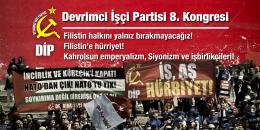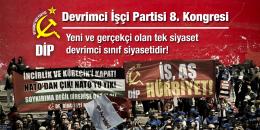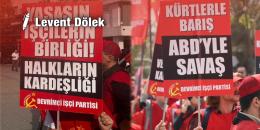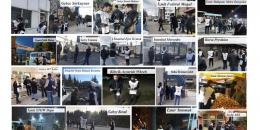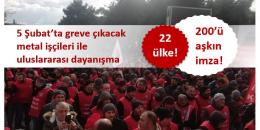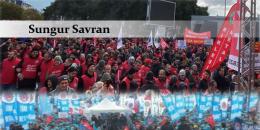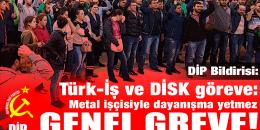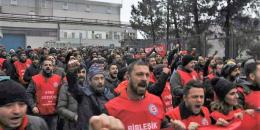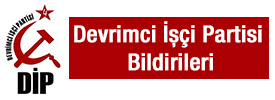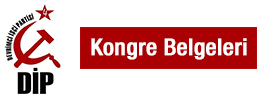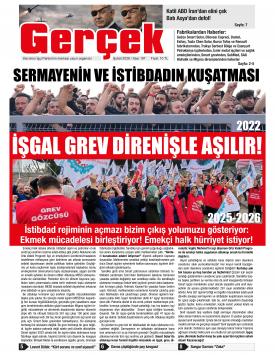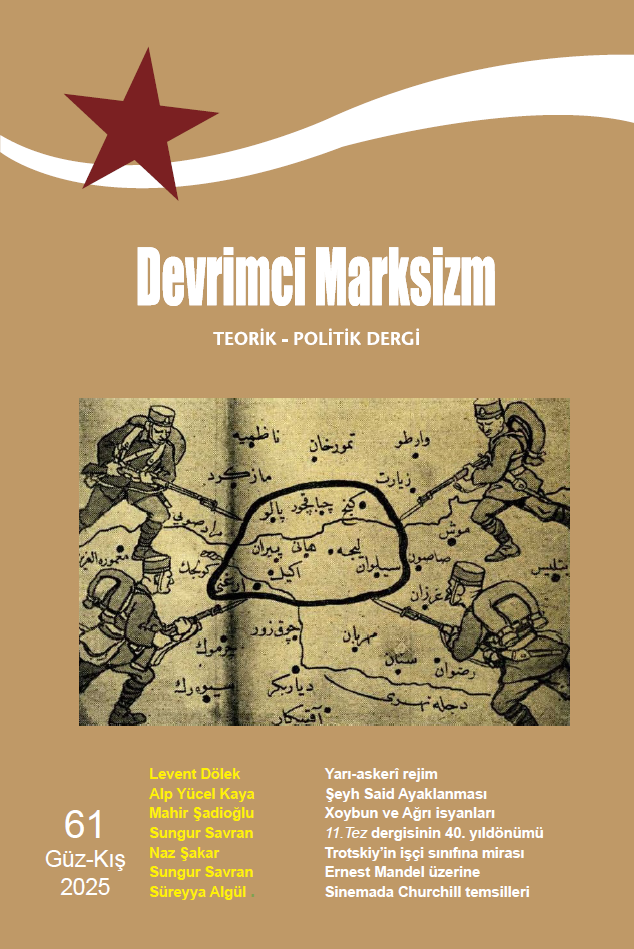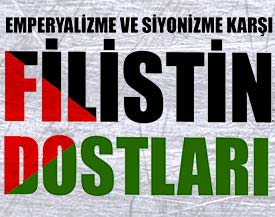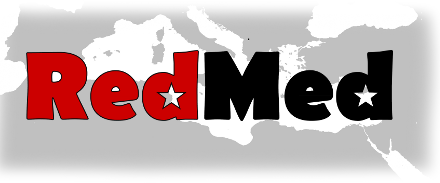Devrimci İşçi Partisi’nden metal grevi için uluslararası dayanışma kampanyası
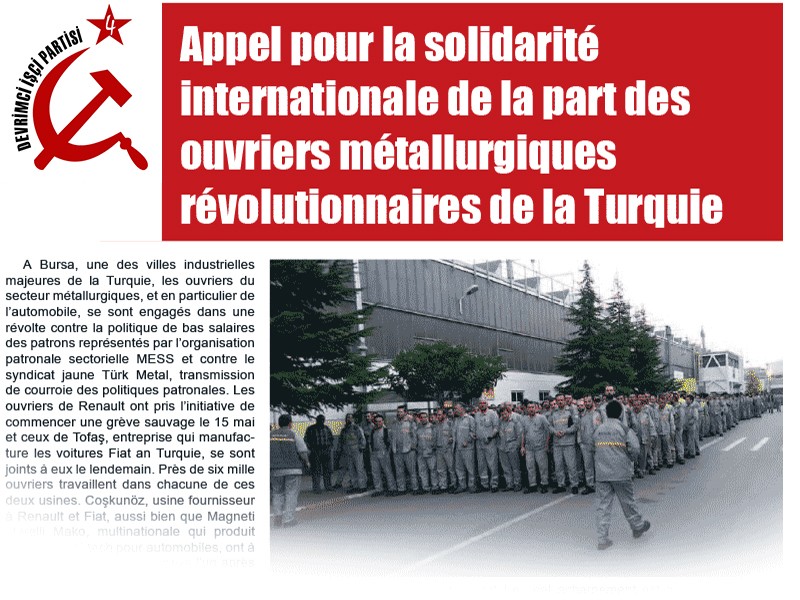
Devrimci İşçi Partisi (DİP), 15 Mayıs’ta Bursa’daki Renault fabrikasında başlayan ve daha sonra dalga dalga yayılarak birçok fabrikaya sıçrayan, halen Bursa, Kocaeli ve Ankara’da devam etmekte olan fiili metal grevi için uluslararası bir dayanışma kampanyası başlattı.
DİP, bu hafta sonu Fransa’nın en önemli devrimci Marksist partilerinden biri olan ve işçi sınıfı içindeki çalışması dikkat çekici düzeyde olan Lutte Ouvrière adlı partinin Paris banliyölerinden birinde düzenlediği festivale katıldı. Bu festival için partinin Fransızca olarak hazırladığı broşürlerden biri bütünüyle metal işçilerinin grevine hasredilmiş durumda. “Türkiye’nin devrimci metal işçilerinden uluslararası dayanışma çağrısı” başlığını taşıyan bu metin, Devrimci İşçi Partisi taraftarı metal işçilerinin bakış açısından yazılmış, büyük fiili metal grevine uluslararası desteğin önemini ortaya koyan bir bildiri. Bu bildirinin ekinde ise metal işçilerinin grevi ile dayanışma ifade eden ve taleplerini destekleyen kısa bir metinle imza toplanıyor.
Aynı kampanya başka ülkelere de yayılacak. İlk adım olarak son aylarda bağımsızlık referandumu ve Mayıs başında yapılan seçimlerde genel bir mücadeleci ruhun ortaya çıktığı İskoçya’da bu yolda bir adım atıldı. DİP taraftarı devrimci metal işçilerinin çağrısı İngilizce’ye çevrildi, Britanya solunda yeni gelişmekte olan, Türkiye’de de çok sevilen ünlü sinema yönetmeni Ken Loach’un girişimiyle inşasına başlanan Left Unity adlı partinin İskoçya seksiyonu aracılığıyla dolaşıma sokuldu. Orada da aynen Fransa’da olduğu gibi kısa metinlerle grevle dayanışma ve taleplere destek yönünde imza kampanyası açılıyor.
Aşağıda “Türkiye’nin devrimci metal işçilerinden uluslararası dayanışma çağrısı” başlığı ile yayınlanan metnin İngilizcesini ve Fransızcasını yayınlıyoruz.
Appeal for International Solidarity from Revolutionary Metalworkers of Turkey
The metalworkers of Turkey are engaged in a revolt against the low-wage policy of their bosses, organised in the industry association MESS, and against the yellow gangster union Türk Metal in total collusion with the bosses’ organisation. The workers of Renault took the initiative by stopping work on 15th May. The workers of Tofaş, the manufacturer of Fiat cars in Turkey, followed suit the next day. This led to a wildfire of strikes in successive factories, including Magneti Marelli Mako, Ototrim, Türk Traktör, Ford Otosan, and Valeo. Workers at other companies in the metal industry are looking towards the movement as well. At the moment when these lines are being written, a total of way over 20 thousand workers have gone on strike and the action at Renault has already left a week behind. It should be emphasized that this is happening in a country where the right to strike has been constricted by the legislation promulgated under the military regime of the early 1980s and is strictly limited to disputes that arise in the collective negotiating process. This strike, on the other hand, has as its sole source of legitimacy the fighting spirit and the unity of the workers. Production has come to a complete halt in these companies, many of which are industrial giants. Moreover, the workers of the last shift to quit in each case have remained inside the factory, spending the nights there, thus bringing these actions close to strikes with occupation.
The top monopolistic capitalist group of Turkey, Koç Holding, is the main local partner of Fiat, Ford, and Magneti Morelli. Turkey is going through the most important workers’ struggle in the metal industry since the military coup of 1980. The metal industry is the top exporter in a country with a level of annual exports totalling 160 billion USD. Metalworkers thus find themselves in a centrally placed strategic position in the overall struggle of the working class in the country. Türk Metal, the yellow union against which the workers have now raised the banner of revolt, is the biggest union in the industry, with close to 140 thousand members, followed way behind by Birleşik Metal, with over 20 thousand members. The latter is affiliated to DİSK, a confederation that comes from a left-wing tradition, while Türk Metal is affiliated to the confederation Türk-İş, much more docile and pragmatic.
This recent struggle of the metalworkers against Türk Metal is not without precedent. In 1988 and again in 2011-12, there were waves of mass resignations from the union and efforts to sign up with Birleşik Metal. However, these efforts were largely frustrated. One should remember that Türk Metal has been the flagship of the new order set up in the early 1980s by the military regime. The confederation DİSK having been shut down by the junta and its leadership thrown in prison, Türk Metal was deliberately promoted into a position of dominance in the metal industry through the close collaboration of the military government and MESS, the bosses’ association. The reason for this well-thought out strategy on the part of the bourgeoisie can be found in the fact that in the period before the coup, a period of great working class militancy, the metalworkers’ union affiliated to DİSK (Maden-İş as it was called) was at the vanguard of the struggles. The military regime was established precisely to stop this wave of great workers’ struggles. Türk Metal was therefore designed to lull the metalworkers’ fight into lethargy. This yellow union is of the US style gangster type and is more akin to a subcontractor company specialised in providing cheap and docile labour to metal companies than to a veritable union.
In 2011, thousands of workers working for the multinational company Bosch abandoned Türk Metal to join Birleşik Metal. As a result of an acrimonious battle, involving a series of methods ranging from layoffs of the more vanguard workers to the beating of some workers by thugs employed by the union bureaucracy and the forging of documents on the part of the union with government complicity, many of these workers later had to resign from Birleşik Metal. There ensued a situation in which neither union had the legally necessary threshold of members to sign a collective contract. It was only this spring that Türk Metal found the requisite number and signed one with the company. However, because of the competition of Birleşik Metal, still enjoying some force in the workplace, this contract contained by far better terms than the group contract that was signed earlier between MESS and Türk Metal for companies that are now on strike. This rift created the crack through which gushed forth the movement. It lifted the lid of the repressed anger of the metalworkers against Türk Metal and triggered the present movement with a demand to have their wages raised to a par with the workers of Bosch. MESS and Türk Metal stood up against this demand in unison, which then started the movement of mass resignations from the yellow union. The physical assault orchestrated by the thugs of the bureaucracy against the workers in revolt only consolidated the movement. Türk Metal has seen large chunks of its membership drift away in a matter of days. In the end, the workers stopped work and refused to leave their workplace. They face the threat of mass layoffs and police repression in a country where both measures have been amply used in the past without any qualms.
The workers put forth three major demands: 1) Wage hikes to equal those granted to the workers of Bosch. 2) Expulsion of the yellow trade union Türk Metal from the factories and the recognition of the authority of the representatives designated by the workers in struggle themselves. 3) Assurance on the part of the bosses that there will be no punitive layoffs. They have not, at least for the moment, joined any other union, nor formed one themselves. They have designated representatives who act as their spokesmen and factory committees that lead the struggle and provide coordination between the different factories. The workers make ample use of social media and each factory has its own outlets of media. However, pages such as Metal İşçisinin Sesi (The Voice of the Metalworker), run by metalworkers who sympathise with the Revolutionary Workers’ Part (DIP), also serve as venues for communication, discussion and coordination of actions.
As a result of deliberate policies pursued by the bourgeoisie and the state since the early 1980s, the overwhelming majority of the metalworkers are totally alien to socialist ideas or left-wing movements. Most of these workers sympathise with the forces of the establishment. The political vanguard is restricted to a miniscule minority. Nationalist, even chauvinistic, ideas abound. But that is paradoxically why the creation of an international solidarity movement is so important, as it will open up a window for these workers to workers of other countries. This solidarity needs to go beyond official and symbolic acts of solidarity between unions (DİSK and metalworkers’ unions in other countries etc.) and involve instances of direct and immediate display of solidarity between workers of different countries and Turkey. This can only be organised through the efforts of the politically conscious vanguard of the workers. Methods abound: from minimal symbolic gestures such as the photographing or filming of brief displays of solidarity on the part of small groups of metalworkers of other countries holding signs that express solidarity in their hands, actions in front of Turkish diplomatic representations all the way to work stoppages, albeit brief, in the case of punitive layoffs or attempted police repression of strikers.
This type of solidarity will no doubt weaken the hold of nationalism within the ranks of the fighting metalworkers, but may as well contribute to the weakening of Islamophobia and extreme right-wing movements or outright fascism in the countries of Europe. We therefore call on you to make an effort of organising solidarity with the metalworkers in struggle.
Long live international solidarity between workers!
Workers of all countries, unite!
Revolutionary Workers’ Party (DIP)
Appel pour la solidarité internationale de la part des ouvriers métallurgiques révolutionnaires de la Turquie
A Bursa, une des villes industrielles majeures de la Turquie, les ouvriers du secteur métallurgiques, et en particulier de l’automobile, se sont engagés dans une révolte contre la politique de bas salaires des patrons représentés par l’organisation patronale sectorielle MESS et contre le syndicat jaune Türk Metal, transmission de courroie des politiques patronales. Les ouvriers de Renault ont pris l’initiative de commencer une grève sauvage le 15 mai et ceux de Tofaş, entreprise qui manufacture les voitures Fiat an Turquie, se sont joints à eux le lendemain. Près de six mille ouvriers travaillent dans chacune de ces deux usines. Coşkunöz, usine fournisseur à Renault et Fiat, aussi bien que Magneti Marelli Mako, multinationale qui produit des pièces hi-tech pour automobiles, ont à leurs tours commencé la grève l’un après l’autre. Au moment où nous écrivons ces lignes, un total de 20 mille ouvriers ont entamé une grève sans aucun fondement légal dans un pays où le droit à la grève est circonscrit strictement à des procédures de négociations collectives. Cette grève, par contre, trouve sa seule source de légitimité dans la volonté de lutte et d’unité des travailleurs. La production a été arrêtée totalement dans tous ces géants d’industrie et les ouvriers de la dernière équipe qui a arrêté le travail restent dans l’enceinte même de chaque usine.
La grève à Coşkunöz a aussi mené à la perturbation de la production dans l’usine Ford, un autre géant du secteur d’automobile à qui Coşkunöz fournit des pièces. Le premier groupe monopoliste de la Turquie, Koç Holding, est le principal partenaire local de Fiat, Ford et Magneti Marelli. Ces grèves ont mené les ouvriers de beaucoup d’autres usines liées à Koç Holding, à la fois à Bursa et ailleurs, à prendre des actions industrielles. La Turquie expérience la plus grande lutte ouvrière dans le secteur métallurgique depuis le régime militaire du début des années quatre-vingt. Le secteur métallurgique est le premier secteur exportateur de l’économie avec une part qui s’avoisine à la moitié de l’exportation totale qui est de l’ordre de 160 milliards de dollars. Les métallos se trouvent naturellement dans une position centrale stratégique en ce qui concerne la lutte de la classe ouvrière dans sa totalité. Türk Metal, le syndicat jaune contre lequel les ouvriers ont hissé la bannière de révolte, est le syndicat principal du secteur avec proche de 140 mille membres, trainé de loin derrière par Birleşik Metal, avec un peu plus de 20 mille membres. Celui-ci est affilié à DİSK, une confédération avec une tradition de gauche, pendant que Türk Metal est affilié à la confédération Türk-İş, beaucoup plus docile et pragmatique.
Cette récente lutte des métallos contre Türk Metal n’est pas sans précédent. En 1988 et de nouveau en 2011, il y a eu des vagues de démissions et des tentatives en masse de s’inscrire à Birleşik Metal. Mais ces tentatives ont échoué. Il ne faut pas oublier que Türk Metal était le vaisseau amiral de l’ordre syndical construit par le régime militaire du début des années quatre-vingt. La confédération DİSK ayant était fermé à l’époque par la junte, Türk Metal a été sciemment promu, à travers une collaboration étroite entre le MESS et le régime militaire, à la position de syndicat dominant dans le secteur. La raison de cet acharnement est très simple : avant le coup d’Etat de 1980, dans un climat de grandes luttes ouvrières, le syndicat des métallos affilié à DİSK était à l’avant-garde de la classe ouvrière entière. Donc sous le régime militaire, établi précisément pour renverser la vague des luttes acharnées du prolétariat contre la bourgeoisie, Türk Metal a été avancé pour amener sous contrôle et domestiquer les métallos afin de taire le prolétariat entier. Ce syndicat doit être caractérisé en tant que sous-traitant qui offre aux patrons le service de ressources humains bon marchés plutôt qu’un syndicat dans le sens stricte du concept.
En 2011, des milliers d’ouvriers ont abandonné Türk Metal pour passer à Birleşik Metal. Beaucoup de ces ouvriers ont dû par la suite démissionner de Birleşik Metal à cause d’une panoplie de pressions, de licenciements de la part des patrons allant jusqu’à des cas de passage à tabac de quelques ouvriers par des gangsters de Türk Metal, en passant par la contrefaçon de documents avec la collaboration du pouvoir. Cela a crée une situation où aucun syndicat n’a atteint le seuil nécessaire jusqu’à ce que Türk Metal ait signé une convention collective ce printemps, après que la convention de groupe couvrant Renault, Fiat, Coşkunöz, Magneti Marelli, Ford etc. ait été signée entre le syndicat et MESS, l’organisation patronale. Or à cause du fait que la présence des partisans de Birleşik Metal a crée une pression supplémentaire, le syndicat jaune a dû signer une convention de loin meilleur que la convention de groupe. C’est cette contradiction qui a détonné la révolte des ouvriers des autres usines, qui ont demandé que leur convention soit remaniée sur la base des acquis atteintes à Bosch. MESS et Türk Metal se sont dressés contre cette revendication d’une seule voix, ce qui a déclenché le processus de démissions à échelle massive du syndicat. Les agressions contre les ouvriers démissionnaires organisés de la part des délégués syndicaux de Türk Metal n’a qu’accéléré la hémorragie. Finalement les ouvriers ont arrêté le travail et refusé de quitter les usines. Les travailleurs font face à une vague de licenciements et une répression policière qui pourraient venir à n’importe quel moment.
Dans cette grande vague de luttes au centre du laquelle se trouvent les usines Renault et Fiat, les ouvriers avancent trois revendications principales : 1) Amélioration salariale ; 2) éviction du syndicat jaune des entreprises ; 3) renoncement aux licenciements de la part du patronat. Les ouvriers ne se sont pas inscrits à un autre syndicat. Ils continuent à lutter sans s’inscrire. Ils ont élu des délégués et désigné des comités d’usine qui dirigent les actions et pourvoient à la coordination entre les différentes entreprises. L’utilisation des médias sociaux est très répandue parmi les ouvriers. Les usines ont bien sûr leurs médias sociaux à eux-mêmes, mais des pages comme Metal İşçisinin Sesi (la Voix du Métallo), organisés par des métallos proches du DIP (Parti Révolutionnaire des Travailleurs), servent aussi en tant que plateforme de communication, discussion et coordination des actions.
Résultat de politiques sciemment suivie depuis l’époque du régime militaire, la majorité écrasante des ouvriers sont totalement coupé des idées de gauche ou socialistes. Le mouvement actuel est sous l’hégémonie des points de vue de droite et beaucoup des ouvriers se sympathisent avec des partis de l’ordre établi. L’avant-garde politisée en est une fraction infime. Des idées nationalistes dominent parmi les ouvriers. C’est donc très important de créer un mouvement de solidarité internationale, qui donnera aux ouvriers une fenêtre au mouvement ouvrier des autres pays. Cette solidarité doit nécessairement déborder les limites des échanges symboliques entre syndicats (DİSK et CGT, DİSK et FIOM etc.) et déboucher sur une solidarité plus immédiate et directe, et donc plus chaude, entre les ouvriers de la France, de l’Italie et de la Turquie. Cela ne peut se matérialiser que par le truchement de l’initiative de l’avant-garde consciente et révolutionnaire de la classe. Les modalités peuvent étendre de l’impacte morale minimale des actions symboliques, des actes de solidarité préparés par les ouvriers avec des pancartes et devises et photographiés ou filmés jusqu’à des arrêts de travail pour solidarité dans les cas éventuels de répression policière, des arrestations ou bien des licenciements en masse.
Ce type de solidarité entre les métallos des pays européens et de la Turquie pourrait bien sûr infléchir l’influence du nationalisme au sein des ouvriers en Turquie, mais aussi contribuer à l’affaiblissement de l’islamophobie, le néo-fascisme ou le fascisme tout court dans les pays européens. Nous vous appelons donc à un travail de solidarité internationaliste qui aiderait les deux côtés à surmonter les limites de l’action à l’échelle nationale.
Vive la solidarité internationale entre les ouvriers !
Travailleur de tous pays, unissez-vous !
Parti Révolutionnaire des Travailleurs (DIP)

